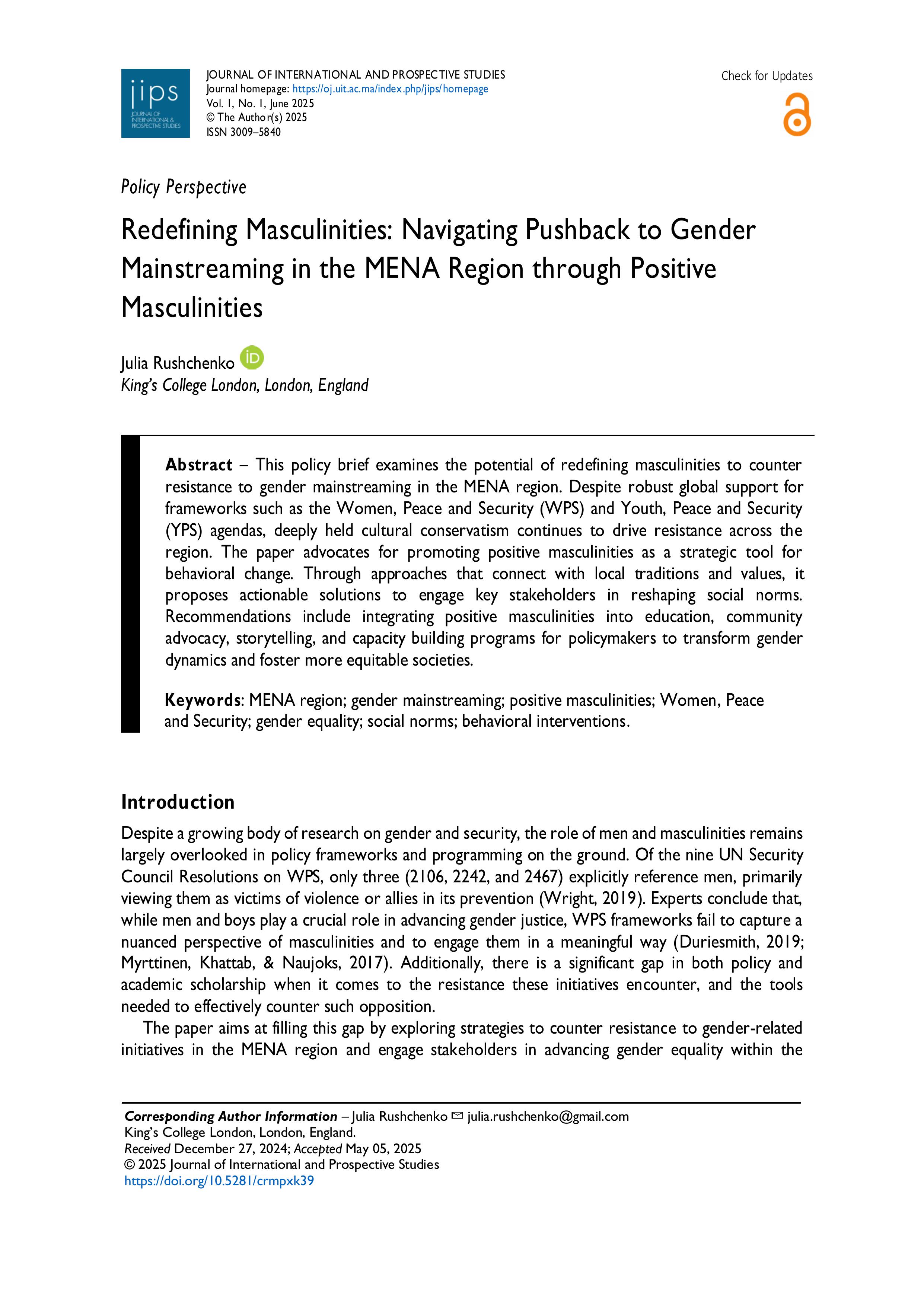Redefining Masculinities: Navigating Pushback to Gender Mainstreaming in the MENA Region through Positive Masculinities
DOI:
https://doi.org/10.5281/crmpxk39Keywords:
MENA region, gender mainstreaming, Positive Masculinities, Women, Peace and Security (WPS), gender equality, social norms, behavioral interventionsAbstract
This policy brief examines the potential of redefining masculinities to counter resistance to gender mainstreaming in the MENA region. Despite robust global support for frameworks such as the Women, Peace and Security (WPS) and Youth, Peace and Security (YPS) agendas, deeply held cultural conservatism continues to drive resistance across the region. The paper advocates for promoting positive masculinities as a strategic tool for behavioral change. Through approaches that connect with local traditions and values, it proposes actionable solutions to engage key stakeholders in reshaping social norms. Recommendations include integrating positive masculinities into education, community advocacy, storytelling, and capacity building programs for policymakers to transform gender dynamics and foster more equitable societies.
Downloads
References
Al-Ali, N. (2019). feminist dilemmas: How to talk about gender-based violence in relation to the Middle East? Feminist Review, 122, 16–31. https://www.jstor.org/stable/26797418
Aldoughli, R. (2024). Romanticizing masculinity in Baathist Syria: Gender, identity, and ideology. Manchester University Press.
Alsawalqa, R. O., Alrawashdeh, M. N., & Hasan, S. (2021). Understanding the Man Box: The link between gender socialization and domestic violence in Jordan. Heliyon, 7(10), e08264. https://doi.org/10.1016/j.heliyon.2021.e08264
Bussolo, M., Ezebuihe, J. A., Muñoz Boudet, A. M., Poupakis, S., Rahman, T., & Sarma, N. (2024). Social Norms and Gender Disparities with a Focus on Female Labor Force Participation in South Asia. The World Bank Research Observer, 39(1), 124–158. https://doi.org/10.1093/wbro/lkad010
Chen, X., & Ge, S. (2018). Social norms and female labor force participation in urban China. Journal of Comparative Economics, 46(4), 966–987.
Codazzi, K., Pero, V., & Albuquerque Sant’Anna, A. (2018). Social norms and female labor participation in Brazil. Review of Development Economics, 22(4), 1513–1535. https://doi.org/10.1111/rode.12515
Duriesmith, D. (2020). Engaging or changing men? Understandings of masculinity and change in the new ‘men, peace and security’ agenda. Peacebuilding, 8(4), 418–431. https://doi.org/10.1080/21647259.2019.1687076
El Feki, S., Barker, G., & Heilman, B. (2017). Understanding masculinities, results from the International Men and Gender Equality Study in the Middle East and North Africa. UN Women and Promundo. https://www.unwomen.org/en/digital-library/publications/2017/5/understanding-masculinities-results-from-the-images-in-the-middle-east-and-north-africa
El Halabi, S., Founouni, Z. N., & Arawi, T. (2019). Social Construction of Arab Masculinity and Its Effects on Mental Health. In Handbook of Healthcare in the Arab World (pp. 1–11). Springer, Cham. https://doi.org/10.1007/978-3-319-74365-3_175-1
Equimundo. (2022). The International Men and Gender Equality Survey: A Status report on men, women, and gender equality in 15 headlines. Equimundo. https://www.equimundo.org/resources/men-and-gender-equality-a-global-status-report-in-15-headlines/
Evrard, A. Y. (2014). The Moroccan Women’s Rights Movement. Syracuse University Press.
General Authority for Statistics. (n.d.). GASTAT Labor force participation rate of Saudi females reaches 36.2%. General Authority for Statistics. Retrieved 24 March 2025, from https://www.stats.gov.sa/w/news/6
Harize, O. (2020, July 2). From militants to student activists: The women who fought for Algeria. Middle East Eye. https://www.middleeasteye.net/discover/algeria-women-militants-independence-activists
Heilman, B., Guerrero-López, C. M., Ragonese, C., Kelberg, M., & Barker, G. (2019). The Cost of the Man Box: A study on the economic impacts of harmful masculine stereotypes in the United States. Equimundo. https://www.equimundo.org/resources/the-cost-of-the-man-box-a-study-on-the-economic-impacts-of-harmful-masculine-stereotypes-in-the-united-states/
Husseini, R. (2021). Years of struggle: The women’s movement in Jordan. Friedrich Ebert Stiftung.
Khedher, R. (2017). Tracing the Development of the Tunisian 1956 Code of Personal Status. Journal of International Women’s Studies, 18(4), 30–37.
Kvinna till Kvinna. (2021). Impact of shrinking space on women organising in Jordan. Kvinna till Kvinna. https://kvinnatillkvinna.org/publications/impact-of-shrinking-space-on-women-organising-in-jordan/
Magdy, R. (2017, March 8). Egyptian feminist movement: A brief history. openDemocracy. https://www.opendemocracy.net/en/north-africa-west-asia/egyptian-feminist-movement-brief-history/
Mottaghi, L. (2021, December 14). Social Norms in MENA. https://thedocs.worldbank.org/en/doc/b173832ce288a8f6e4a4971bfaa6184d-0310012021/related/Lili-Mottaghi-SAR-Workshop-on-Social-Norms-in-MENA.pdf?utm_source=chatgpt.com
Myrttinen, H., Khattab ,Lana, & and Naujoks, J. (2017). Re-thinking hegemonic masculinities in conflict-affected contexts. Critical Military Studies, 3(2), 103–119. https://doi.org/10.1080/23337486.2016.1262658
Pérez-Martínez, V., Marcos-Marcos, J., Cerdán-Torregrosa, A., Briones-Vozmediano, E., Sanz-Barbero, B., Davó-Blanes, Mc., Daoud, N., Edwards, C., Salazar, M., La Parra-Casado, D., & Vives-Cases, C. (2023). Positive Masculinities and Gender-Based Violence Educational Interventions Among Young People: A Systematic Review. Trauma, Violence & Abuse, 24(2), 468–486. https://doi.org/10.1177/15248380211030242
Rozana. (2024, December 29). [Aisha Debs: We will not allow space for those who disagree with us] عائشة الدبس: لن نفتح المجال لمن يختلف معنا بالفكر.. وسوريات ينتقدن. Rozana FM. https://www.rozana.fm
Sallal, S. (2025, February 11). Syrian women fight for equal political representation post-Assad. The New Arab. https://www.newarab.com/features/syrian-women-fight-equal-political-representation-post-assad
UN Women – Arab States. (n.d.-a). Because I am a man campaign. UN Women – Arab States. Retrieved 24 March 2025, from https://arabstates.unwomen.org/en/what-we-do/ending-violence-against-women/because-i-am-a-man-campaign
UN Women – Arab States. (n.d.-b). ‘Dare to Care’: Transforming Patriarchal Masculinities and Social Norms. UN Women – Arab States. Retrieved 24 March 2025, from https://arabstates.unwomen.org/en/what-we-do/masculinities-social-norms-and-youth/dare-to-care
United Nations Population Fund (UNFPA). (2022a). Men Engage. UNFAP Turkmenistan. https://turkmenistan.unfpa.org/en/men-engage
United Nations Population Fund (UNFPA). (2022b, December 9). Positive Masculinity: Helping Eliminate Violence Against Women in the West Bank. UNFPA-Palestine. https://palestine.unfpa.org/en/news/positive-masculinity-helping-eliminate-violence-against-women-west-bank-0
United Nations Population Fund (UNFPA). (2023, October 12). Communications Plan for Engaging Men and Boys to End Violence Against Women and Girls In Central Asia. UNFPA-Kazakhastan. https://kazakhstan.unfpa.org/en/publications/communications-plan-engaging-men-and-boys-end-violence-against-women-and-girls-central
United Nations Population Fund (UNFPA). (2024, November 15). UNFPA Uzbekistan Launches Training Program to Engage Men in Promoting Gender Equality and Preventing Violence. UNFAP Uzbekistan. https://uzbekistan.unfpa.org/en/news/unfpa-uzbekistan-launches-training-program-engage-men-promoting-gender-equality-and-preventing
Whidden, G. (2019). “If There Be One Only, She Shall Inherit Half”: Explaining the Preservation of Islamic Inheritance Law in Tunisia ’s 1956 Personal Status Code [Honors Theses]. https://scarab.bates.edu/cgi/viewcontent.cgi?article=1349&context=honorstheses
Wright, H. (2020). “Masculinities perspectives”: Advancing a radical Women, Peace and Security agenda? International Feminist Journal of Politics, 22(5), 652–674. https://doi.org/10.1080/14616742.2019.1667849

Downloads
Published
Issue
Section
License
Copyright (c) 2025 Julia Rushchenko (Author)

This work is licensed under a Creative Commons Attribution-NonCommercial 4.0 International License.

